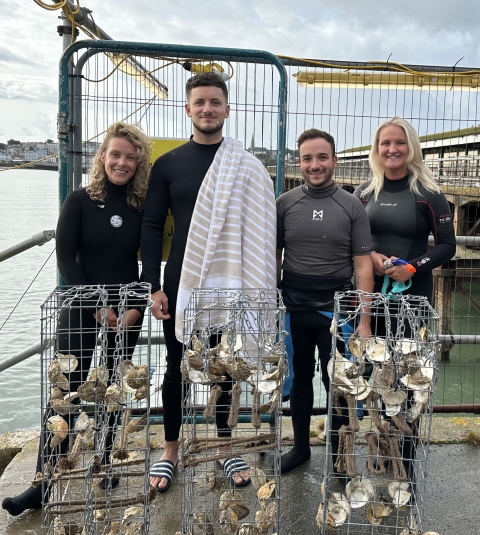Marine scientists from the University of Portsmouth have been underneath Wightlink's historic Ryde Pier to place new habitats on the 200-year-old structure.
The students swam beneath Ryde Pier Head close to the FastCat terminal and securely fixed three 'BioHuts' to the metal piles. The large cages, containing oyster shells and hessian rope, will remain there for two years and will be monitored for signs of marine life inside. Similar projects elsewhere in the Solent have seen several species of fish and even endangered European eels swimming in and around the BioHuts.
Providing new habitats will increase biodiversity by encouraging juvenile fish and cuttlefish to set up home inside them so populations can increase.
Project leader Georgios Georgiou, Research Assistant in the School of Biological Sciences
Project leader Georgios Georgiou, Research Assistant from the University's School of Biological Sciences, has already been carrying out assessments of the rich seagrass meadows under the Pier: "We need to help the environment as much as possible. Providing new habitats will increase biodiversity by encouraging juvenile fish and cuttlefish to set up home inside them so populations can increase. We expect the cages will quickly become colonised by marine flora, then marine creatures are likely to follow."
Wightlink Chief Executive Keith Greenfield added: "Wightlink is committed to looking after the environment we sail through every day and we are pleased to support University of Portsmouth marine scientists with their research projects. Our customers and colleagues are fascinated by the marine life of the Solent."

BSc Marine Biology students from the University of Portsmouth
Three University of Portsmouth undergraduates took part in the installation with Georgios. They were BSc Marine Biology students Abby Easton, Kristy Johnson and Benjamin Hazell. Earlier in 2023, research student Emma Chappell installed cuttlefish 'nurseries' beneath the pier.
In 2017, Wightlink worked with Sandown-based ARC Consulting to install six artificial rockpools, known as Vertipools™ at Fishbourne Harbour. The triangular-shaped basins are now covered with weed and early surveys found more than 30 species living inside them.
"Seagrass beds, salt marshes and kelp forests play an invaluable role in the Solent environment," adds Georgios. "This research will provide us with the information on the health and productivity of these ecosystems, along with initiating conservation and rewilding efforts, that will improve the biodiversity associated with these ecosystems across the Solent."






